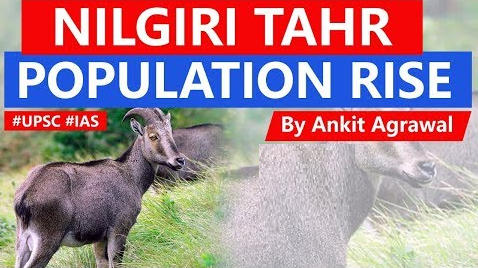Table of Contents

IN NEWS
- There has been almost 27% increase in the population of the tahr in the Mukurthi National Park over the last 3 years.
- Nilgiri tahr’s sightings in the Park have risen from 568 in 2018 to 612 this year.
- This was the 2nd consecutive year that an increase in the population of the animal had been recorded in the park.
- Officials said the upward trend was good news, as the new data reinforced last year’s findings.
- There was a decrease in tahr numbers in 2017, when a population of only 438 was recorded, down from 480 in 2016.
- The findings also pointed to a healthy sex ratio, slightly skewed in favour of female goats.
FACTORS RESPONSIBLE FOR INCREASE IN POPULATION
- Keeping the national park closed to tourists.
- Free from poaching.
- Fighting the spread of invasive flora.

MUKURTHI NATIONAL PARK
- It is 78.46 km2 protected area located in the northwest corner of Tamil Nadu in the Western Ghats.
- The park was created to protect its keystone species, the Nilgiri Tahr.
- The park is characterised by montane grasslands and shrublands interspersed with sholas in a high altitude area of high rainfall.

- It is also home to an array of endangered wildlife, including royal Bengal tiger and Asian elephant, but its main mammal attraction is the Nilgiri tahr.
- It was previously known as Nilgiri Tahr National Park.
- It is part of Nilgiri Biosphere Reserve
- Mudumalai Wildlife Sanctuary (TN), Bandipur National Park (Ktk), Nagarhole National Park (Ktk), Wayanad Wildlife Sanctuary and Silent Valley(KL).

NILGIRI TAHR
- It is also known as Nilgiri Ibex.
- It has been listed as “Endangered” by IUCN & Schedule 1 of the Wildlife (Protection) Act, 1972.
- It is the state animal of Tamil Nadu and found in open montane grassland habitat of rain forests ecoregion.
- It is endemic to the Nilgiri Hills and the southern portion of the Western Ghats in Tamil Nadu, Kerala.

THREATS TO NILGIRI TAHR
- Habitat loss (spread of invasive plants)
- Poaching
- Populations of these animals are small and isolated,
- Climate Change
Latest Burning Issues | Free PDF






















 WhatsApp
WhatsApp